TO TURN OFF A WORLD GONE MAD, FIND LOONS
Thus far, I’ve used my “perch” to ponder and comment (OK, pontificate) on strife, conflict, suffering and human folly. Now it’s time for a break, to follow the dictum of “Desiderata”, the idealistic poem we ‘boomers’ taped on our bedroom wall: “Go placidly amid the noise and the haste…”.
The best time and place I know to do that is early morning, wedged into my kayak.
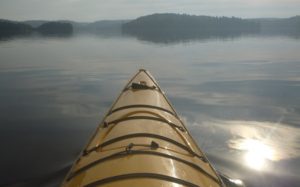
Invented by the Inuit of Greenland, the basic kayak design has remained unchanged for millennia, a textbook example of how to adapt to the world rather than trying to alter or dominate it.
My beacon as I slide off across a kilometer-wide stretch of open water is a stand of birch trees, a slash of white amid the sombre coniferous and hardwood trees that predominate here. If I’m lucky, I come upon loons hunting for breakfast. For non-Canadian readers, they’re the birds featured on our one-dollar coin, which, surprise, we call a “loonie”. The two-dollar coin is, of course, a “toonie”. Their haunting calls are the iconic “sound of the wilderness”. (Click this link, put the volume up, and be amazed). They are also probably what gave rise to the expression “crazy as a loon”, which is ironic, since loons seem to be far saner than humans. Loon pairs tend to return to the same lake, and often the same nest, every year. Except for size (males are bigger) they are indistinguishable, and share parenting duties equally for what is usually only one chick a year.
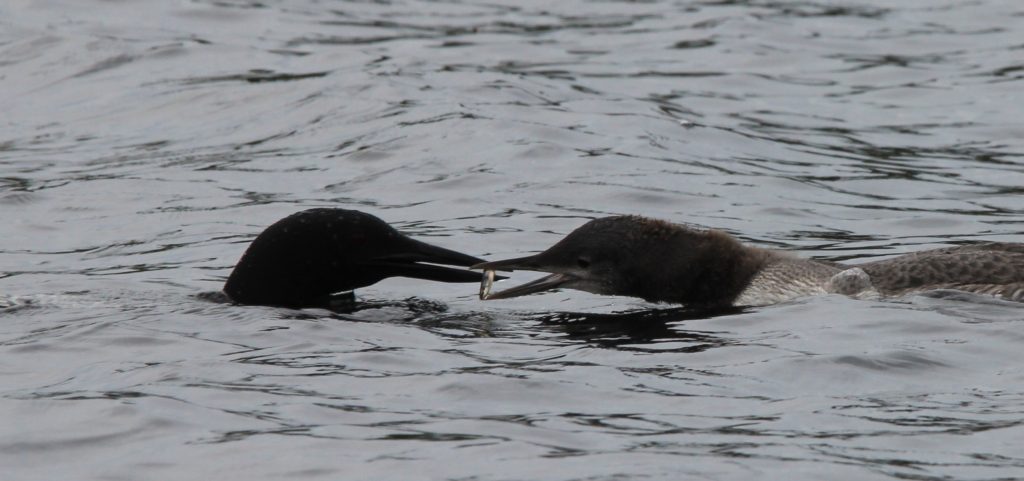
When they have twins, the stronger sometimes kills the weaker in the struggle for food, which is more understandable than the human predilection of killing for political power, or just because you can.
In another lesson for humans, loons practice a system of amicable divorce. And don’t be fooled by their placid look. Get too close and you’ll quickly learn that loons are fierce and noisy defenders of their territory and young.
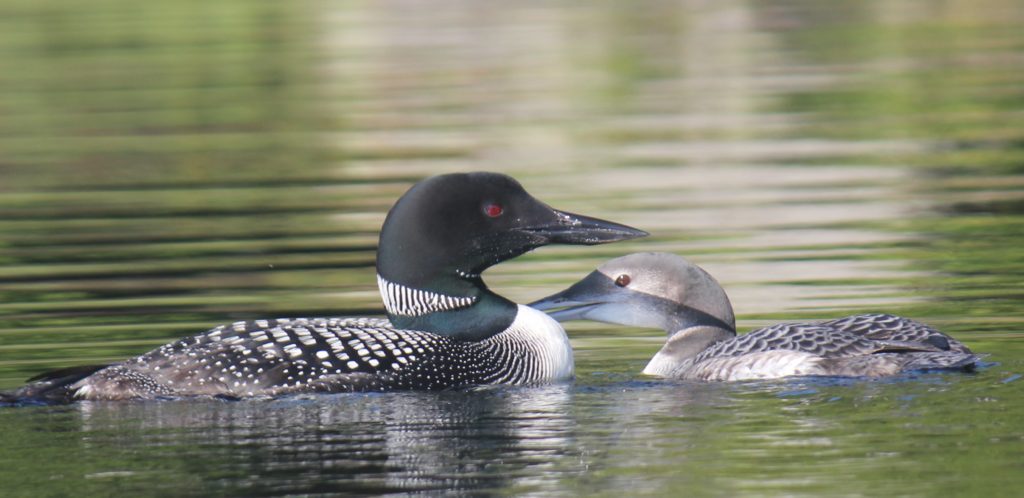
The chick’s ‘Covid mask’ is actually the shadow of the parent’s head. (Photo: Author)
Loons are inedible, have solid bones to help them dive as deep as 70 meters (230 feet) and stay submerged for more than three minutes. Red pigment in the retina of their eyes filters light to help them hunt at depth.
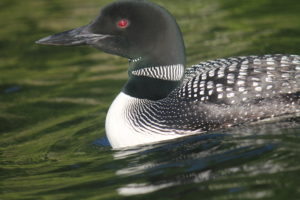
They make less noise when they duck under the water than my paddle does, no matter how carefully I stroke as I reach my birch markers and veer right along the granite shoreline. The Canadian Shield is among oldest rock on earth. The lakes here — some deeper than 50 meters (165 feet) — were gouged out by glaciers, which took thousands of years to recede. Human enterprise has managed to melt glaciers dramatically in mere decades. How clever of us…
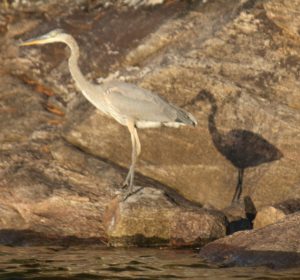
Perhaps it would help focus minds on climate change if it was portrayed as more of a threat to humans as a species than to the planet per se. The close-packed trees and the creatures I slip past make me think only Nature has the tenacity, let alone ability to cling on and regenerate against seemingly insurmountable odds.
For the most part the soil here is only centimeters deep. Canadian poet AJM Smith summed it up in the last lines of “The Lonely Land”, his wondrously evocative homage to the shores of Georgian Bay:
This is the beauty
of strength
broken by strength
and still strong.
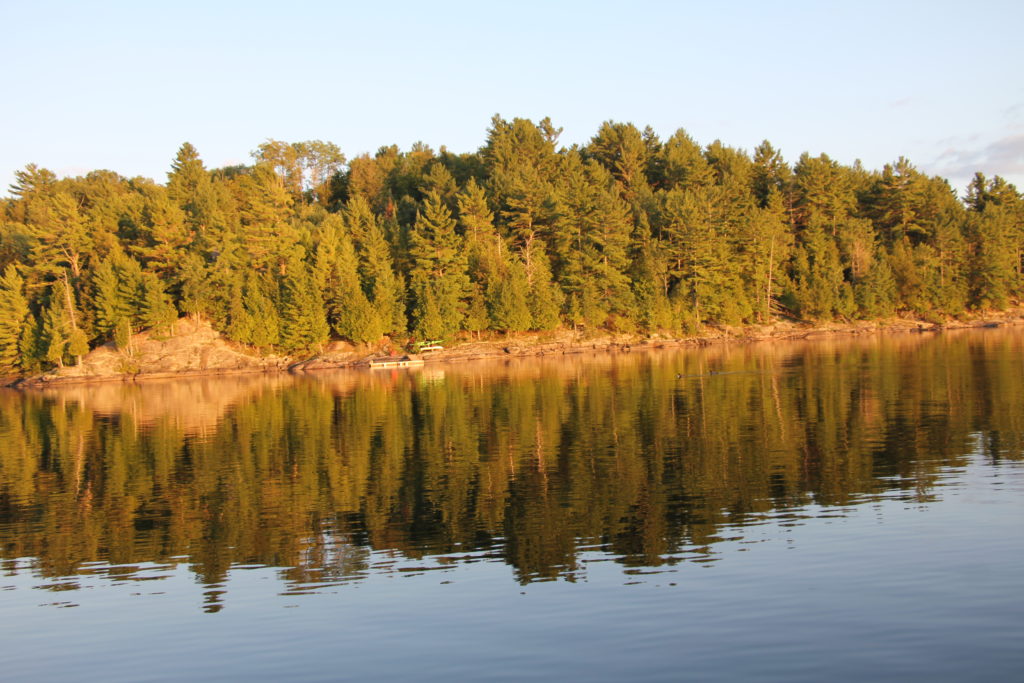
Late afternoon light (Photo: Author)
The trees here are what’s known as “second growth”. The original forest, dominated by white pines thrusting up a hundred feet (30+ meters) and more, was exploited almost to extinction in the early 19th century to supply timber for the European ship-building industry. That of course included warships…but we won’t go there.
No doubt next week will provide mayhem, silliness and folly to view from my perch. But this week “Go placidly” seemed a better idea, eh?
Comments are welcomed. Click CONTACT
To receive alerts of future posts, Click SUBSCRIBE
16 thoughts on “TO TURN OFF A WORLD GONE MAD, FIND LOONS”
Wonderful. Except I couldn’t find the loon link. Had to be satisfied with Greg Abbott on YouTwat.
The link should be https://pizzeysperch.com/to-turn-off-a-wo…e‑mad-find-loons/
Oh, Allen. I thought I heard George Winston’s compositions while reading this. My mind travelled over the early morning misty waters breathing the cool air looking at those wonderful sceneries you describe and publish. Thank you for the joy you granted me going through this lovely article. Have a nice time. Suella
If that evoked George Winston, one of my favourites, then I am more than pleased. Thanks Suella.
Nothing like taking friends along on a peaceful paddle through nature. Thanks for that Pizz
Always a pleasure to have friends along. Thanks Sigi
Delightful piece. Thank you x
I still have my (dog-eared and stained) Desi poster. Time to re-stick!
Delightful piece. Thank you x
I still have my (dog-eared and stained) Desi poster. Time to re-stick!
Susan would have thoroughly enjoyed this. Miss her.
thanks for the moment of zen. Loved the shots. A bit of peace is more than welcome right now.
Thanks Joyce. So pleased you enjoyed it
Thanks Pizzey, first thing I read this Sunday morning. Stunning pix too, I know how difficult it is to capture any birds let alone from a kayak. Glad to hear you’re still fit. Jordan
Coming from a photographer of your caliber, Peter, I’ll take that as a serious compliment. Thank you.
Hi there I am so happy I found your website, I really found you by mistake, while I was looking on Digg for something else, Nonetheless I am here now and would just like to say thank you for a tremendous post and a all round thrilling blog (I also love the theme/design), I don’t have time to read it all at the moment but I have book-marked it and also included your RSS feeds, so when I have time I will be back to read a great deal more, Please do keep up the great work.
I truly love your blog.. Excellent colors & theme. Did you develop this website yourself? Please reply back as I’m planning to create my very own site and want to learn where you got this from or what the theme is named. Kudos!
The theme is NISARG. I got it free from WORDPRESS (they offer hundreds) and then tweaked it to suit my needs.